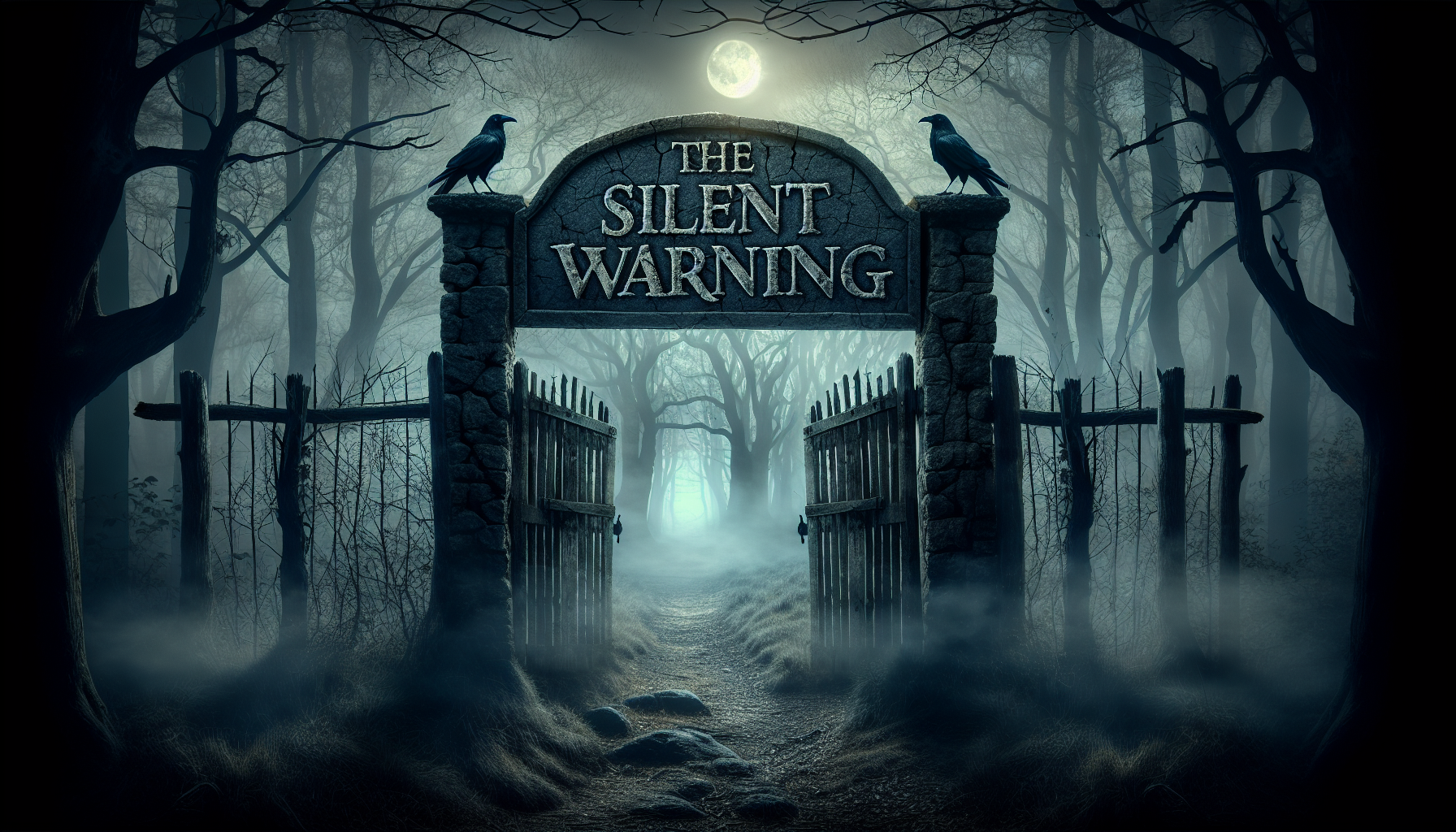Chapter 1: The Unearthly Silence
It was an ordinary afternoon in the small town of Maplewood. The sun shone lazily through the high branches of the ancient oaks that lined the streets, casting dappled shadows across the pavement. Life continued at its usual pace; children laughed and played, and neighbors exchanged brief greetings as they passed one another.
Yet, for Isabella Reed, there was something unsettling in the air, a peculiar stillness, as if the world was holding its breath. She noticed it when she walked home from her job at the local library, a strange quietness that seemed to follow her every step. The usual rustle of leaves or chirping of birds was conspicuously absent.
Isabella shrugged off her unease, convincing herself it was just her imagination. Her life had not been particularly exciting lately, and perhaps her mind was concocting drama where there was none. Still, the feeling lingered, a silent warning whispering just beyond the periphery of her mind.
Chapter 2: The Lost Journal
That evening, as Isabella settled into her small, tidy apartment, she decided to distract herself with some old books she’d found at a local garage sale. Among them was a worn leather journal, its cover frayed and pages yellowed with age. Intrigued, she opened it carefully.
The journal was filled with entries dating back over a century, written in elegant cursive. The writer was a woman named Eliza Hargrove, who seemed to have been a resident of Maplewood in the late 1800s. As Isabella read, she was drawn into Eliza’s world, a time of horse-drawn carriages and candlelit evenings.
But as she continued, the entries took a darker turn. Eliza wrote of hearing strange noises at night, whispers in the wind that seemed to warn her of impending danger. The warnings were never clear, but they were persistent, growing more intense with each passing day.
Isabella felt a chill run down her spine as she read the final entry, dated only days before Eliza’s disappearance, which was never solved. It spoke of an unnerving silence, much like the one Isabella had felt earlier that day.
Chapter 3: Unsettling Connections
The following day, Isabella could not shake the eerie connection she felt with the journal. She spent her lunch break at the library digging through old records, newspapers, and town archives, searching for any mention of Eliza Hargrove. What she found only deepened the mystery.
Eliza was indeed a resident of Maplewood, and her disappearance had been a topic of local legend. According to old newspaper clippings, she had been well-liked but often spoke of hearing things no one else could. The townsfolk dismissed her as eccentric, until she vanished without a trace.
As Isabella read, she discovered a pattern of other disappearances and unexplained events in Maplewood, all seemingly connected by the same inexplicable silence. It was as if the town itself harbored a secret, one that was both ancient and dangerous.
Chapter 4: The Gathering Storm
Determined to uncover the truth, Isabella began to dig deeper, reaching out to local historians and anyone who might have knowledge of Maplewood’s past. Her days were consumed with research, and her nights were filled with dreams—no, nightmares—where she wandered through a silent forest, always searching, never finding.
One evening, she received a phone call from a man named Harold Kline, a historian who claimed to have crucial information. They agreed to meet at a small café on the edge of town. Harold was an older man, his face lined with the marks of age and wisdom.
Harold listened patiently as Isabella recounted her experiences and discoveries. He seemed unsurprised, nodding knowingly. “Maplewood has always been a strange place,” he said. “There are legends that speak of a curse, a silence that descends before tragedy strikes.”
Isabella’s heart raced as Harold spoke. He shared stories of past residents who had suffered similar fates to Eliza, each marked by the same ominous silence. It was as if the town itself was alive, its intentions unclear and malevolent.
Chapter 5: Whispers in the Dark
With Harold’s guidance, Isabella began to piece together the fragments of the past. The more she learned, the more convinced she became that the silence was a warning, not just for her but for the entire town. Something ancient and powerful was at work, and Eliza’s journal was a key to understanding it.
But as she delved deeper, the warnings intensified. The silence became more than an absence of sound; it was a presence, a force that seemed to watch her, follow her into her dreams. Isabella knew she was close to the truth, and with each day, the danger grew.
One night, as she pored over her findings, her apartment was plunged into darkness. The electricity flickered out, casting the room into shadow. In the silence that followed, Isabella heard it—the whispering voices, just as Eliza had described.
They were soft and indistinct, but unmistakably there, filling the room with a sense of foreboding. Isabella’s heart pounded as she listened, trying to decipher the words. It was a warning, she was sure of it, but its meaning eluded her.
Chapter 6: The Reckoning
Determined to confront the source of the warnings, Isabella decided to visit the old Hargrove estate, a dilapidated mansion that had stood empty since Eliza’s disappearance. Armed with a flashlight and a resolve hardened by fear, she made her way to the outskirts of town.
The mansion loomed ahead, its windows like hollow eyes watching her approach. The silence was deafening, a tangible force that pressed against her as she stepped inside. The air was thick with dust and history, and Isabella felt the weight of centuries as she explored the darkened halls.
In the library, she found a portrait of Eliza, her eyes haunting and sad. As Isabella gazed at the painting, she felt a connection, a sense of shared purpose. Eliza had tried to warn the town, and now it was up to Isabella to finish what she had started.
Driven by a mixture of fear and determination, Isabella ventured deeper into the house. In the cellar, she discovered a hidden room, its walls covered with cryptic symbols and writings. It was a place of power, a focal point for the town’s mysteries.
Chapter 7: The Silent Warning
As Isabella studied the symbols, the whispers returned, louder and more insistent than ever. They filled her mind with images and emotions, a torrent of information that was both overwhelming and enlightening. She understood now that the silence was not a curse, but a warning—a plea for help.
The spirits of the past were trapped, their voices silenced by a force they could not escape. They needed someone to listen, to understand and act. The silence was their only means of communication, a desperate attempt to reach out from beyond the veil.
With newfound clarity, Isabella realized what she had to do. She gathered her notes and prepared to share her findings with the town. It was time for Maplewood to confront its past and break the cycle of silence and fear.
As she left the mansion, the silence lifted, replaced by the gentle rustle of leaves and the distant call of birds. It was a new beginning, a chance for healing and redemption. Isabella knew the road ahead would be difficult, but she was no longer afraid.
Chapter 8: The Dawn of Change
In the days that followed, Isabella worked tirelessly to spread the word. She organized meetings, shared Eliza’s journal, and presented her research. Slowly, the townspeople began to listen, to understand the significance of the silent warnings.
With each meeting, the shadows of the past began to recede, replaced by a sense of hope and determination. The town came together, united by a common purpose: to acknowledge their history and ensure that the silence never returned.
As the sun set over Maplewood, Isabella stood on the porch of the Hargrove estate, looking out over the town. The air was filled with the sounds of life, vibrant and full. The silence had been broken, its warning heeded, and the future was bright with promise.
Isabella knew that Eliza’s spirit was finally at peace, her message heard at last. She smiled, feeling a deep sense of fulfillment. The silent warning had brought them together, and in doing so, had saved them all.



